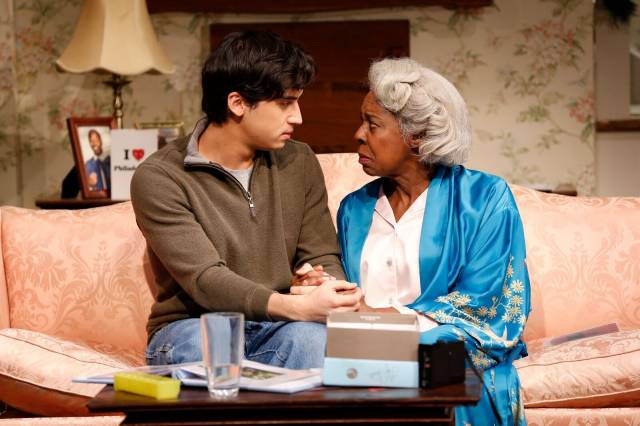

The curtain at Colman Domingo’s Dot shows a two-story house done in the pointillistic technique, which will make audience members think of one of two things: Stephen Sondheim’s Sunday in the Park with George or the establishing shot in a sitcom. While one would hope for the former, given the ingenious, if somehow crude use of dots to reflect the title character’s mental unraveling, what we sadly get is the latter. As the curtain opens we learn the house in question is set in present day Philadelphia, where we meet Dot (Marjorie Johnson), her daughter Shelly (Sharon Washington) and their longtime neighbor Jackie (Finnerty Steeves). As Shelly tries to fix her mother breakfast, while catching up with Jackie - who has been living in NYC - we see her become altered by her mother’s constant insults and her repetitive statements. As Dot takes a bathroom break, the evident truth becomes crystal clear, as Shelly explains that her mother has been diagnosed with dementia.
What follows are two acts filled with more stereotypes and clichés than there were dots in the opening curtain. We see Dot’s children gather in her home for the holidays, each of them bringing their own very heavy emotional baggage. Dot’s son Donnie (Stephen Conrad Moore) is a freelance music critic undergoing a matrimonial crisis with his husband Adam (Colin Hanlon), Dot’s youngest daughter Averie (Libya V. Pugh) is a “sassy hairdresser” type who wears colorful prints and fires tons of double innuendos and witticisms every time she speaks, and type-A Shelly, being the eldest, is trying to keep everything under control while finding the best care for their mother.
Scene after scene, the siblings have the kind of arguments we’ve seen countless times in forgettable Sunday afternoon flicks; there’s even a moment where they all burst into a choreography that makes them bond for a hot second. The few moments of tremendous insight in Domingo’s script are diluted by his constant use of obvious manipulation and facile symbolism - Dot stores her most cherished memories in a chest she hides in the basement - and Susan Stroman’s direction is serviceable, but aimless throughout.
There’s a point where the show has become so stereotypical that you wonder if you’re actually watching a satire of the dozens of similar plays and films that have touched on the same subjects. For instance, Domingo’s script has Adam and Jackie - two of the three white characters - become cutesy sidekicks, which could be a deliciously subversive take on tokenism, but lands flat because of how sincere they are. Similarly, all the other characters exist just for their scenes; at one point Shelly forgets to pick up her son (who we never see) and we assume it’s not a flaw of the character, but that the playwright forgot the character even existed and wanted to note that he actually hadn’t. It’s only appropriate that during a cringeworthy moment in which every single character complains about the smell of a dish fixed by Averie, they are all reminded there’s nothing a little hot sauce won’t fix. What Dot lacks is precisely the soul that would’ve made it soul food.